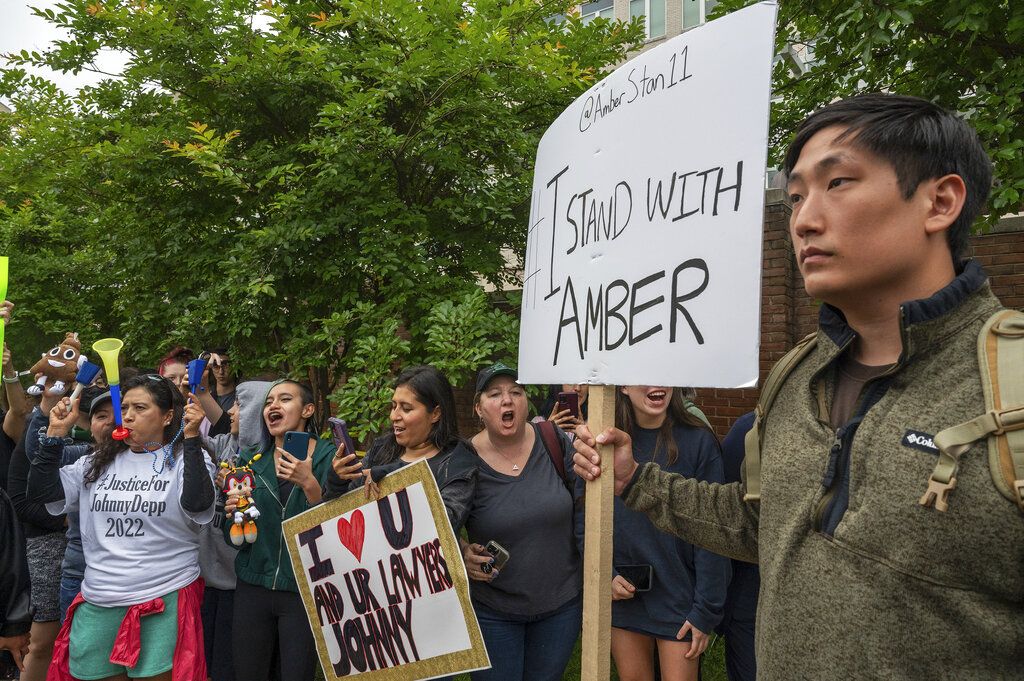
Fairfax: A seven-person civil jury in Virginia will resume deliberations Tuesday in Johnny Depp’s libel trial in opposition to Amber Heard. What the jury considers can be very completely different from the general public debate that has engulfed the high-profile proceedings. For six weeks, testimony centered on particulars of alleged abuse that Heard says she suffered by the hands of Depp. Heard has outlined greater than a dozen particular situations the place she says she was assaulted by Depp.Also Read – What Lessons We As Society Should Take From Johnny Depp Vs Amber Heard Case
Depp has denied any bodily or sexual abuse, and says Heard concocted the claims to destroy Depp’s fame. Depp’s legions of on-line followers have centered on their perception that Heard has been untruthful, and that that can decide the end result. Also Read – Elon Musk-Amber Heard’s Threesome Reports: All About Rumoured Affair And Its Link With Johnny Depp Case
But the case itself is a defamation declare. Depp sued Heard for libel — for $50 million — in Fairfax County Circuit Court over a December 2018 op-ed she wrote in The Washington Post describing herself as “a public figure representing domestic abuse.” Also Read – From Threesome With Elon Musk to Defecating in Bed After Argument, 5 Startling Revelations in Johnny Depp-Amber Heard Case
That article by no means even mentions Depp by identify, however his attorneys say he was defamed nonetheless. Most of the article discusses public coverage because it pertains to home violence, and Heard’s attorneys say she has a First Amendment proper to weigh in.
In closing arguments, although, Depp lawyer Camille Vasquez argued that Heard’s free-speech rights have limits. “The First Amendment doesn’t protect lies that hurt and defame people,” she mentioned.
Depp’s attorneys level to 2 passages within the article that they are saying clearly confer with Depp.
In the primary passage, Heard writes that “two years ago, I became a public figure representing domestic abuse, and I felt the full force of our culture’s wrath.” Depp’s attorneys name it a transparent reference to Depp, provided that Heard publicly accused Depp of home violence in 2016 — two years earlier than she wrote the article.
In a second passage, she states, “I had the rare vantage point of seeing, in real time, how institutions protect men accused of abuse.” (Depp’s attorneys are additionally in search of damages over a headline that appeared above the net model of the article, regardless that Heard didn’t write it.)
The jury, which has to come back to a unanimous determination for a verdict, should resolve whether or not these passages within the Post are defamatory. And the decision type offers them step-by-step directions on the right way to decide that.
Heard’s attorneys say they’ve offered a mountain of proof that Heard was abused. But they are saying that even when the jury have been someway to imagine that she was by no means abused even a single time, she ought to nonetheless prevail within the lawsuit.
That’s as a result of libel regulation spells out a number of elements that have to be thought of. First, the alleged defamatory statements need to be in regards to the plaintiff. Heard’s attorneys mentioned the article shouldn’t be about Depp in any respect. He’s not talked about, they usually say the main focus is on Heard’s expertise in regards to the aftermath of talking out. Those statements stay objectively true even when she wasn’t in reality abused, her attorneys contend.
Depp’s attorneys, although, say the 2 passages are clear references to Depp, given the publicity that surrounded their 2016 divorce proceedings.
In addition, as a result of Depp is a public determine, Heard can solely be discovered responsible of libel if the jury decides that Heard acted with “actual malice,” which requires clear and convincing proof that she both knew what she was writing was false or that she acted with reckless disregard for the reality.
Heard lawyer J. Benjamin Rottenborn mentioned throughout Friday’s closing arguments that Heard fastidiously reviewed drafts of the article — the primary draft was written not by her, however by the American Civil Liberties Union — along with her attorneys to ensure that what was written handed authorized muster. Rottenborn mentioned that reality alone is adequate proof that she didn’t act with precise malice.
As for the abuse itself, Depp’s attorneys tried to recommend to the jury that in the event that they suppose Heard is mendacity or embellishing any of her abuse claims, that she will’t be trusted and that every one of her abuse claims have to be dismissed as untrustworthy.
“You either believe all of it, or none of it,” Vasquez mentioned. “Either she is a victim of ugly, horrible abuse, or she is a woman who is willing to say absolutely anything.”
In Heard’s closing, Rottenborn mentioned the nitpicking over Heard’s proof of abuse ignores the very fact there’s overwhelming proof on her behalf and sends a harmful message to domestic-violence victims.
“If you didn’t take pictures, it didn’t happen,” Rottenborn mentioned. “If you did take pictures, they’re fake. If you didn’t tell your friends, they’re lying. If you did tell your friends, they’re part of the hoax.”
And he rejected Vasquez’s suggestion that if the jury thinks Heard may be embellishing on a single act of abuse that they need to disregard every thing she says. He mentioned Depp’s libel declare should fail if Heard suffered even a single incident of abuse. “They’re trying to trick you into thinking Amber has to be perfect to win,” Rottenborn mentioned.